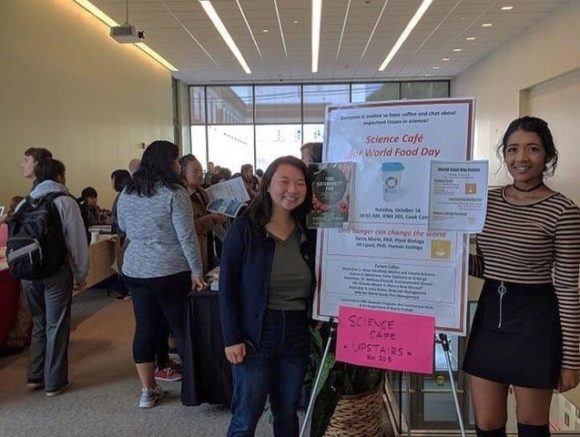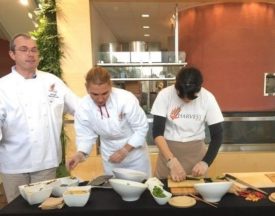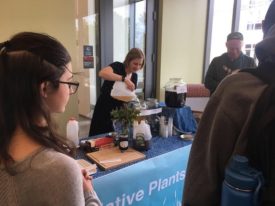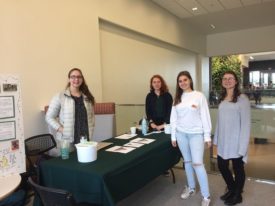
President and founder of the Rutgers Compost club, Dorothy Lee, and dedicated club member, Devika Jaikumar at the start of the fair.
By Dorothy Lee (SEBS’19) – Department of Ecology, Evolution and Natural Resources

Chef Ian Keith and two of Harvest Cafe’s staff assembling and presenting sushi made from fonia, a gluten-freen grain in the millet family. It is a superfood, is a good source of protein, drought resistant and adaptable to arid climates.
The Food Sustainability Fair—held on World Food Day, October 16th—aimed to educate students about the cycle of food: before the plate, on the plate, and beyond the plate. I wanted to engage students in learning more about where food comes from and where it goes, with a focus on the environmental and social impacts of their food choices.
The idea for the fair started in the spring of 2018 with a desire to bring more awareness of the food cycle to the Rutgers community because many people don’t know where their food comes from or where it ends up after it’s thrown away.
Initially, I reached out to students and clubs that I knew were passionate about these topics, and gathered a group of people to brainstorm on the kind of event we thought would make the most impact. I reached out to organizations and people within the Rutgers and New Brunswick communities who had projects or missions relating to the cycle of food, asking if they would be interested in tabling at the event. Our group continued working on the goal, format, location, and logistics.

Ecology/ Landscape Architect graduate student, Amy Gage, teaching folks about the sustainability of plating native species and all the different food you can make with them. Follow her rooftop native species garden in Manhattan on Instagram @grazetheroof.
At the fair, our tabling partners presented topics including: the importance of soil health, food security, community farmers market, Food and Water Watch’s campaigns, Rutgers Global sustainability programs, NJPIRG’s initiatives, Veg Society’s mission to change people’s diet behaviors, the potential of duckweed, recipe possibilities for growing and harvesting native plants, IFNH’s Harvest Café’s sustainable practices, and the reduction of food waste and composting education.
We also partnered with Dr. Lipoti and Dr. Morin’s “Zero Hunger Can Change the World” Science Café. The conversation that was initiated there was continued at the fair’s tabling sessions.

Rutgers Compost Club preparing to teach people about compost, reducing food waste and the food recovery hierarchy. Pictured from left: Kristin Terez, Brigitte Schackerman, Ava Mroz and Emily Hughes.
Over 200 people attended, sampling nutritious, sustainably harvested food, and many walked away with a better understanding on how they can improve their sustainability practices and support local organizations to empower others.
“Having a thorough understanding of our food cycle allows us to make more informed decisions about the choices we make to decrease our carbon footprint and to lead a more sustainable lifestyle. Going vegan or zero waste may be too extreme for some, but small changes and educating ourselves may positively inform our decisions and opinions. It allows us to confidently voice our beliefs while still being open minded to other opinions.”
I would like to extend thanks to Dr. Lipoti, Dr. Morin, the RU Compost Club, NJPIRG, Rutgers Global, Rutgers Soil Lab, Rutgers Against Hunger, Rutgers Student Food Pantry, New Brunswick Community Farmers Market, Amy Gage, the Lam “Duckweed” Lab, Food and Water Watch, Veg Society, Harvest Café, and Chef Ian Keith.

